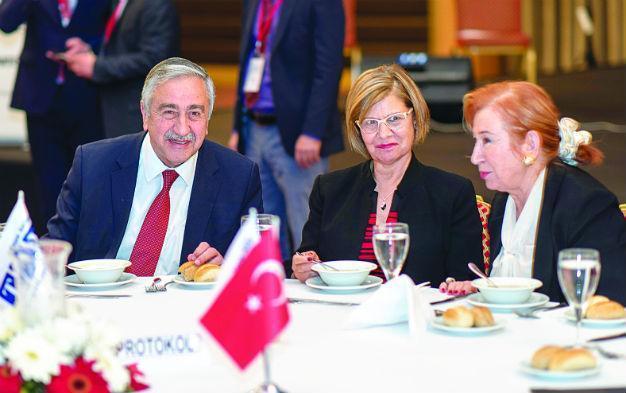Gov’t issues on both sides ‘may affect Cyprus talks: Akıncı
Deniz Çiyan - ISTANBUL

Hürriyet photo/ Muhsin Akgün
The recent fall of the government in Turkish Cyprus and the parliamentary elections in Greek Cyprus in May could have an impact on the United Nations-brokered peace talks on the divided Mediterranean island, Turkish Cypriot President Mustafa Akıncı has told the Hürriyet Daily News.“[The government crisis in Turkish Cyprus] does not currently affect [the peace process] and we hope that it will not affect it,” said Akıncı on April 7 on the sidelines of the 19th Eurasia Economic Summit organized by the Marmara Group Foundation in Istanbul.
“If the current situation turns into a crisis and elections are scheduled soon, this will affect [the talks],” he added. “If this process takes parliament to an early election, than I would choose for it to be done quickly so the structure to be formed is established as soon as possible,” he said.
The government of Prime Minister Ömer Kalyoncu, which was formed in July 2015, collapsed on April 5, when Akıncı accepted the government’s resignation and Akıncı directly started to hold talks with political parties represented at parliament.
Akıncı said that as an impartial president, he did not favor any political party, but only wished for a model that will “win the approval of the parliament, solve citizens’ problems, and work harmoniously” with himself during negotiations for a federal system to be established with the Greek Cypriot community.
Although the fall of the government and the ongoing coalition meetings have not yet had a big impact on the peace negotiations, the parliamentary elections in Greek Cyprus scheduled for on May 22 have slowed the flow of the talks.
“The Greek side does not like it when I say it, but this is a truth: There are parliamentary elections there on May 22. This unavoidably affects the negotiations table, because we are going through a sensitive era and attitudes during the election process change things,” Akıncı said.
Cyprus has been divided since 1974 when Turkey intervened in the northern side after a coup attempting to unite the island with Greece took place. The Turkish and Greek Cypriot administrations have since May 2015 been engaged in re-launched peace talks under the guidance of the United Nations.
Akıncı and Greek Cypriot President Nicos Anastasiades jointly expressed at the Davos Economic Summit earlier this year that a peace agreement on the island was possible within 2016.
Speaking on April 7, Akıncı said he still believed a deal could be reached before the end of this year.
“I believe there is a possibility for a solution in 2016 … Me and the Greek Cypriot leader have expressed that this can happen but we cannot expect it to happen by itself within a short span of time,” he said, adding that the pace of talks needed to be stepped up in order to reach this aim.
Stating that he, Anastasiades and the U.N. all say progress has been made in four out of six chapters being negotiated in the peace talks, Akıncı stressed that this was “not enough.” The two untouched chapters concern land arrangements as well as security and guarantee issues.
Akıncı said they were using the negotiations principle of the “Integrated Whole Approach,” which means that developments reached in minor parts of the negotiations only carry weight if a consensus is reached in the broader negotiations.
Emphasizing that there are still two more chapters that need to start being discussed, Akıncı repeatedly said the pace must be picked up in order to reach a solution by the end of 2016.
















